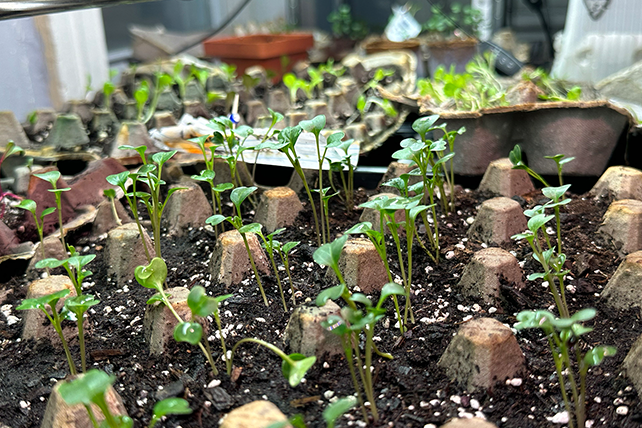NEW YORK (RNS) — For decades the Catholic Worker movement has served meals at its two soup kitchens at Maryhouse and St. Joseph House in Manhattan’s East Village, feeding hungry New Yorkers from the thousands of pounds of fresh produce the workers grew at a farm in upstate New York named for the movement’s co-founder, Peter Maurin.
Every fall, workers at the 49-acre farm in Marlboro, New York, transported kale, onions, potatoes and other fresh produce to the houses. “Back in the 1980s we went back and forth to the farm regularly,” said Bernie Connaughton, who has been part of the Catholic Worker movement for more than 40 years.
But in 2022, the farm’s owner and Catholic Worker stalwart, Tom Cornell, died, and while his son Tommy has taken charge of operations, his health isn’t good and the farm has fallen into disrepair. “The farm is a mess right now,” Tommy Cornell said. “There is no farming actually going on anymore. I can’t carry it.”
But at Maryhouse — where tattered photos of Jesus cover the walls and visiting groups sometimes ask to see the bedroom that was used by Maurin’s co-founder, Dorothy Day, who is in the process of becoming a saint — something new is growing. Inspired in part by Maurin’s dream of “agronomic universities” — communal farms where workers would learn to work the land — a group of veteran and younger Catholic workers has planted a garden on the roof of the historic Maryhouse, the 19th century building where Day lived and worked until her death in 1980.
“We are building something new in the shell of the old,” said Jim Robinson, professor of religious studies at Iona University and a member of the newly founded Integral Ecology Circle, the group behind the garden.
Dorothy Day founded the Catholic Worker in New York in 1933 with friend, social activist and French theologian Maurin. What began as an effort to publish a social justice-oriented newspaper became better known for its “houses of hospitality,” where unpaid volunteers prepare meals, give away clothes and provide shelter to people in need.
Since 1975, when Day purchased the Maryhouse on Third Street, the building has served vulnerable women in New York City and housed dozens of Catholic Worker volunteers.
The garden was first conceived last September, when more than 75,000 people took part in a march to end fossil fuels sponsored by a coalition of climate groups in Manhattan. Connaughton, Robinson and two other members of the New York Catholic Worker found each other in the crowd and met afterward to talk.
“We thought, how can our community respond in a more specific way to this concern?” said Liam Myers, 26, an adjunct professor of religious studies at Iona and the youngest resident at Maryhouse.
A month after the march, Pope Francis published his second encyclical, a cry for ecological action titled “Laudate Deum.” Saying that the world’s response to climate change has been inadequate, the pope urged on Catholics the idea of “integral ecology,” which he saw as a link between environmental and social justice. Later in the fall, a small group, including Myers, Nathan Dufour Oglesby, Connaughton and Robinson, met for the first time, calling themselves the “Integral Ecology Circle” or IEC.
By January, the IEC hosted its first Friday night meeting at Maryhouse, and by March the group had tripled in size, to 23 people.

